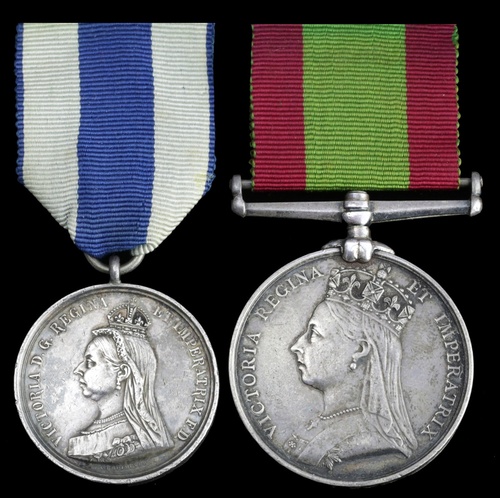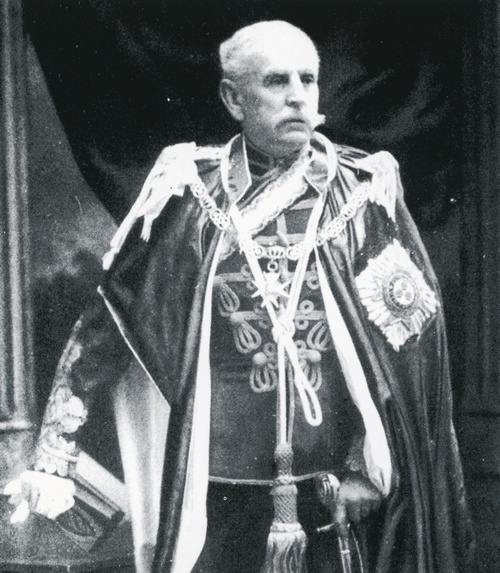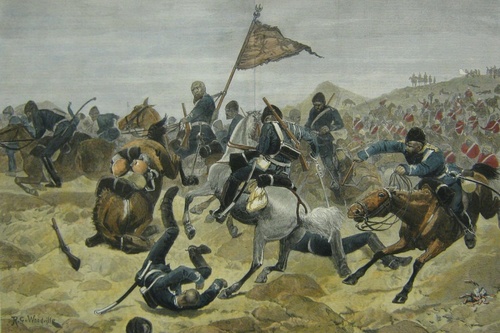Auction: 18001 - Orders, Decorations and Medals
Lot: 274
'One of the 15th Hussars' finest products was Sir George Luck, a brusque, fire-eating type of soldier of the old school. In his day there was no-one whose opinions on the cavalry arm, and its employment in war, were more respected. As a boy I often heard my father [Field Marshal Sir John French] quoting George Luck as a kind of oracle on cavalry.'
Lieutenant-Colonel Hon. E. G. French, D.S.O.
The important Second Afghan War and Jubilee Medal pair awarded to General Sir George Luck, G.C.B., Colonel of the 15th Hussars
'A big man of fine physique, strong voice and strong language', he established himself as one of the great cavalry leaders and tacticians of the Victorian era: such were his glowing talents that he was employed as Inspector-General of Cavalry in both India and Great Britain
His powers of leadership in battle were never more prominent than in the Second Afghan War, when every officer of the 15th Hussars 'slew his man' in a bloody hand-to-hand clash at Takht-i-Pul on 4 January 1879: himself wounded by a sword cut to his right arm, Sir George nonetheless slew two of his opponents
Afghanistan 1878-80, no clasp (Majr. G. Luck, 15th Hussrs.); Jubilee 1897, silver, edge bruising, otherwise very fine (2)
George Luck was born at Blackheath, Kent on 24 October 1840 and purchased a Cornetcy in the 15th Foot in April 1858. Advanced - by purchase - to Lieutenant in December 1859, he exchanged into the 6th Dragoons in the following year. Having then obtained a Captaincy, he transferred to the 15th Hussars in September 1868. He was subsequently present in the Jowaki Expedition of 1877-78 (Medal & clasp).
Second Afghan War - C.B.
Advanced to Major in the opening months of the conflict, Luck served in the Kandahar Column, including the advance to Khelat-i-Ghilzie. He subsequently commanded the Advanced Cavalry in Brigadier-General Palliser's Force, in which capacity he distinguished himself in the action at Takht-i-Pul on 4 January 1879. On that occasion he was wounded by a sword cut contusion to his right arm whilst commanding a squadron of the 15th Hussars and two troops of the Punjab Cavalry. It was a most gallant hand-to-hand-affair and each officer of the 15th Hussars 'slew his man', Luck accounting for two of the 150 Afghans killed in the action. Shadbolt's The Afghan Campaigns 1878-80 takes up the story:
'About 1 p.m., Major Luck, 15th Hussars, who was in command of the reconnoitring party consisting of 100 sabres, 15th Hussars and 28 sabres of the 1st Punjab Cavalry, which had been dispatched through the Konna Pass into the Takht-i-Pul Valley, sent a message to the effect that he had exchanged shots with the enemy's scouts, and that they were retiring before him. After proceeding a distance of some three miles, the cavalry neared the northern entrance of the Ghlo Pass from the Kandahar direction, and found the enemy, to the number of not less than 300, debouching from it in a leisurely retirement before the advance of Colonel Kennedy's force. The 15th Hussars and 1st Punjab Cavalry, led by Major Luck, at once swept forward to the charge, and were received with a volley from the carbines of the Afghan horsemen who, after a short hand-to-hand encounter, turned and fled, and were pursued for some distance by the squadron and completely defeated, leaving 28 dead on the field, and losing altogether about 100 killed, wounded or prisoners. For his services on this occasion, Major Luck, who was in command of the cavalry, was appointed a Companion of the Bath.'
Luck subsequently commanded the 15th Hussars in General Phayre's Division in the second campaign, taking part in the advance on Kandahar (Medal). In addition to his C.B., he was twice mentioned in despatches (London Gazettes 7 November 1879 and 25 January 1881, refer).
First Anglo-Boer War
Advanced to Lieutenant-Colonel, Luck next commanded the 15th Hussars in the First Anglo-Boer War.
The regiment landed at Durban in February 1881 and, following the defeat at Ingogo River, was based at Newcastle. Ordered to the battle area by General Colley, Luck refused to budge until - as he had been ordered - he was joined by the 60th Rifles.
In the event, Colley gave Luck command of all of our cavalry and he led a mixed squadron of the 6th Dragoons and the 14th and 15th Hussars as an escort to Sir Evelyn Wood when he met Zulu Chiefs at Inhlazatze Mountain. The party returned in September 1881.
Inspector-General of Cavalry - India and Great Britain
Luck remained in command of the 15th Hussars until October 1884, when he was appointed Brigadier-General Bombay. A stint as Brigadier-General Bengal followed and, in October 1887, he was appointed Inspector-General of Cavalry in India.
It was in the latter role that he quickly established himself as one of the most influential - and successful - cavalry leaders of the Victorian era, a fact supported by countless testimonials from the great and the good. During manoeuvres in India in 1890, General Smith-Dorrien was attached to Luck's Headquarters. He later wrote:
'Sir George, rightly, had large ideas of the powers of cavalry, and recognised that they must be accustomed to long marches and surprise action, and during these manoeuvres immense distances were covered - as much as fifty miles in a day on one occasion. To me they were most instructive.'
Field Marshal Birdwood was equally impressed, describing Luck as 'a fine-looking man':
'I have never known his equal for swinging whole Cavalry Divisions about the country and bringing them in long, galloping lines dead onto their objective. In those days, many of the Indian cavalry regiments were not very efficient. Luck very soon found this out and dealt drastically with the trouble. He was a man who was never prepared to spare himself or others.'
Birdwood adds that Luck's wrath for inefficiency was never far from the surface:
'One day he noticed a certain officer, when trotting past, saluting with his sword instead of keeping it at the carry. Luck galloped up to him furiously: "What's your name, sir? He barked. "Trotter, sir," was the nervous reply. "Damn you, sir," shouted the General, "It ought to be Walker!" '
In April 1895, Luck's transparent qualities as a cavalry leader and tactician resulted in his appointment as Inspector-General of Cavalry on the home establishment. It was a quite unique achievement.
He was appointed K.C.B. in June 1897 and G.C.B. on his retirement as a General in June 1909, and acted as Colonel of the 15th Hussars from 1904 until his death in December 1916:
'It is certain that the name of Sir George Luck will be honourably connected for all time with the regiment for which he has done so much, and all ranks are proud to recognize him as their chief.'
Subject to 20% VAT on Buyer’s Premium. For more information please view Terms and Conditions for Buyers.
Sold for
£950









